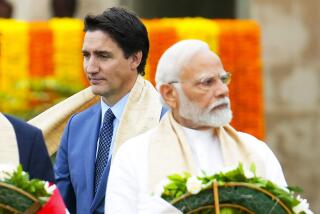Indian Criticism of Pakistan Escalates
- Share via
NEW DELHI — Indian Prime Minister Manmohan Singh said Friday that the railway bombings in Mumbai had support from “elements across the border” in Pakistan, escalating the war of words between the two nuclear-armed neighbors and further casting a pall over the possibility of peace between them.
During a visit to survivors of Tuesday’s synchronized blasts, Singh accused Islamabad of falling down on its pledge not “to promote, encourage, aid and abet terrorism,” saying “that assurance has to be fulfilled before the peace process and other processes progress.”
His remarks were the highest-level allegation yet that archrival Pakistan was at least indirectly responsible for the bombings, which killed as many as 200 people and wounded hundreds. Senior Indian officials had refrained from blaming Pakistan, concerned that it might scuttle already-spluttering talks between the two countries.
But investigators have said in the last few days that the explosions that ripped through a key commuter line in Mumbai, formerly known as Bombay, during the height of the evening rush hour, bore the hallmarks of Lashkar-e-Taiba, an Islamic militant group.
Lashkar-e-Taiba, or Army of the Pure, wants India to relinquish its portion of the contested Himalayan region of Kashmir. The group is based in Pakistan, operating through a Muslim charity, despite Islamabad’s insistence that it has banned the group.
Pakistani officials Friday continued to deny allegations of involvement in the bombings. A spokeswoman warned New Delhi against using the attack as a pretext for further slowing the talks, which have made only incremental progress in the last few years.
“The peace process between Pakistan and India is a separate matter. It is in the interest of both” that dialogue continue, Pakistani Foreign Ministry spokeswoman Tasnim Aslam said.
Talks between the foreign ministers of the two countries, which were scheduled for next week, appear increasingly in doubt.
Before his remarks Friday, Singh had been under growing pressure to speak out strongly against Pakistan, from both his political rivals, who accuse the government of taking too soft an approach to Islamabad, and the public, which has embraced the view that Pakistan was directly or indirectly behind the bombings. Newspaper editorials urged the prime minister to condemn the “jihad factory” next door.
The Indian government previously has blamed Lashkar-e-Taiba for terrorist attacks, often without publicly citing much evidence beyond similarities in methods.
Among the attacks laid at the group’s door are the coordinated bombings in October that killed more than 50 people in New Delhi and a brazen 2001 assault on the Indian Parliament that nearly sparked a fourth war between the two countries.
There has been little real progress in resolving the dispute over Kashmir, which both sides claim as their rightful territory but has been divided between them for almost 60 years.
A Muslim insurgency aimed at setting up an independent state or uniting Kashmir under Pakistani rule has killed tens of thousands of people in the last two decades and shows little sign of abating. On the day of the railway bombings in Mumbai, eight Indian tourists were killed in a series of grenade attacks by suspected Islamic militants in Srinagar, the summer capital of the Indian-controlled side.
But the possibility of Pakistani involvement in such a deadly attack on Mumbai, India’s financial center, raised the stakes. Singh said terrorist cells in India were clearly “instigated, inspired and supported by elements across the border, without which they cannot act with such devastating effect.”
“They clearly want to destroy our growing economic strength.”
More to Read
Sign up for Essential California
The most important California stories and recommendations in your inbox every morning.
You may occasionally receive promotional content from the Los Angeles Times.











